50 English Phrases to speak fluent English
Guys, agar aap English bolna chahte hain to Grammar seekhne ki zaroorat nahi hai, ye 50 English Phrases aap rat len aur aaj se hi English bolna shuru karen.
Of course not :
Bilkul bhi nhi (बिलकुल भी नही )
A says : Do your parents let you stay out late?
B say : Of course not. They always ask me to get home before 10 pm each night.
Used to:
अकसर (Aksar)
A says : Do you stay with your parents?
B says : Right now, no, but I used to.
If somebody says “if you want to eat this let me know”
Second person replies “yes i do” .
A says : Do you enjoy spicy food?
B says : Yes, I do, especially on cold days.
A says : Do you often drink alcohol when eating out?
B says : No, not often. Just when I have parties with my friends.
IT’S (BEEN) + DAYS / WEEKS / MONTHS / etc. + SINCE
Kafi din/mahine / saal ho gye (काफ़ी दिन /महीने/साल हो गए )
The structure it’s (been) + days / weeks / months / etc. + since is used to emphasise the length of time that has passed since a past event:
- It’s been weeks since his last blog post.
- It’s been a long time since I met him.
- How long has it been since they moved away?
Bit Scared :
thoda dra hua (थोड़ा डरा हुआ )
- I was bit scared.
- Mai thoda dra hua tha.
- I was bit busy.
- Mai jra busy hu.
- I was bit occupied.
- Mere pass jra kaam tha .
- I was bit late .
- Mai jra late tha.
- His behaviour was bit off.
- Uska vevhaar thoda ajeeb tha.
Drive me up the wall
(Gussa dilana ) गुस्सा दिलाना
A says : Hey you didn’t sleep soundly. ( kya tum raat ko arram se nhi soye ?)
B says : No , the neighbour’s loud music drove me up the wall last night. ( nhi, mere pdos ke unche music ne mujhe gussa dila diya )
A says : Hey , you are driving me up the wall.
B says : Tum mujhe gussa dila rhe ho.
Not on speaking terms
(bol chal band hona )बोल चाल बंद होना
- A says : Hey , how is your friend ?
- (Tumhara dost kaisa hai ?)
- B says : Well , we are not on speaking terms .
- (Vaise , hmari bol chal band hai .)
Fret not
( chinta mat kro ) चिंता मत करो
- Fret not, it’s really not a big deal.
- Chinta mat kro , ye koi badi baat nhi hai .
Rings a bell
( yaad dilana) याद दिलाना
- Your name rings a bell.
- Tumhara naam kisi ki yaad dilate hai.
I do
( mai karta hu ) मैं करता हूँ
- Do you work online ?
- Yes, I do.
I did
( maine kiya ) मैंने किया
- Did you watch movie yesterday ?
- Yes, I did.
What time do you ?
( kitne bje)
- What time do you get up ?
- Tum kitne bje uthte ho ?
- What time do you return home ?
- Tum kitne bje ghar aate ho ?
- What time do you leave for work ?
- Tum kitne bje kaam pe jate ho ?
What time did you ?
( kitne bje ) कितने बजे
- What time did you get up yesterday ?
- Tum kitne bje uthe ?
- What time did you return home ?
- Tum kitne bje ghar aaye ?
- What time did you leave for work ?
- Tum kitne bje kaam pe kab gye?
Usually
( aksar ) अकसर
- I usually get up before eight .
- Mai aksar 8 bje se pehle uthta hu .
I wish
( kash!) काश !
A says : I went to movie last night .
B says : I wish , I’d have gone with you.
It’s getting
( ho rha hai ) हो रहा है
A says : It’s getting dark.
B says : Andhera ho rha hai .
A says : It’s getting cold.
B says : Thand ho rhi hai .
A says : It’s getiing cloudy.
B says : Badal ho rhe hai .
Now and then
( kabhi kabhi ) कभी कभी
A says : Do you come to this café often?
B says : No, I only come here now and then.
I like to watch movie now and then.
Idioms for daily speaking : Health
Video on Idioms for daily speaking for help:
Here are idioms which will help you to speak smart english:
- Fit as a fiddle: Meaning: In excellent physical condition or health.
- A picture of health: Meaning: Someone who looks very healthy.
- In the pink: Meaning: In good health and spirits.
- On top of the world: Meaning: Feeling great or in perfect health.
- Hale and hearty: Meaning: Strong and healthy.
- As right as rain: Meaning: In good health or perfect condition.
- Bursting with energy: Meaning: Full of vitality and enthusiasm.
- In tip-top shape: Meaning: In excellent physical condition.
- Back on one’s feet: Meaning: Recovered from an illness or setback.
- Full of beans: Meaning: Energetic and lively.
- A clean bill of health: Meaning: Confirmation that someone is in good health.
- Fit and healthy: Meaning: In good physical condition.
- A breath of fresh air: Meaning: Something that revitalizes or refreshes, often used metaphorically for good health.
- Out of the woods: Meaning: Recovered from a difficult situation, often related to health.
- In the best of health: Meaning: Enjoying excellent health.
- In fine fettle: Meaning: In good physical and mental condition.
- As fit as a flea: Meaning: In excellent health and fitness.
- Alive and kicking: Meaning: Well and active.
- Like a well-oiled machine: Meaning: Functioning smoothly, often used to describe good health.
- Run like clockwork: Meaning: Operating efficiently and smoothly, often used to describe a healthy body or system.
[qsm quiz=1]
Conversation between teacher and student
I have tried to explain Simple English conversation between teacher and student. Teachers generally speak these English sentences in classroom while teaching students.
watch a video on ‘ Conversation between teacher and student ‘
Tell me : mujhe btao ( मुझे बताओ )
- Tell me the answer to this question ?
- मुझे प्रश्न का उत्तर बताओ ?
- Mujhe prashan ka utar btao ?
- Tell me your name ?
- मुझे अपना नाम बताओ ?
- Mujhe apna nam btao ?
- Tell me about ‘ photosynthesis’?
- मुझे फोटोसिन्थिस्य्स के बारे में बताओ ?
- Mujhe photosynthesis ke bare me btao ?
- Tell me what I told you about this topic yesterday?
- मुझे बताओ कि मैंने इस बारे में क्या बताया ?
- Mujhe btao ki maine iss bare me kya btaya ?
Let me ( मुझे ……दो )
- Let me check.
- मुझे चेक करने दो |
- Mujhe check karne do .
- Let me check your notebook.
- मुझे कॉपी चेक करने दो |
- Mujhe copy check karne do .
- Let me check your uniform.
- मुझे यूनिफार्म चेक करने दो |
- Mujhe usniform check karne do .
- Let me do my work.
- मुझे मेरा काम करने दो |
- Mujhe mera kaam karne do .
- Write it on your notebook.
- कॉपी पे लिख लो |
- Copy pe likh lo .
- Write it on your book.
- किताब पे लिख लो |
- Kitab pe likh lo .
- Write it twice/ thrice/ ten times
- इसे दो बार /तीन बार / दस बार लिखो |
- Isse do /teen/dus baar likho .
- Write it again.
- इसे दोबारा लिखो |
- Isse dobara likho .
- Don’t do this/that.
- ये मत करो |
- Ye mat kro .
- Don’t talk.
- बात मत करो |
- Baat mat kro .
- Don’t run.
- भागो मत |
- Bhaago mat .
- Don’t sit ideal.
- फ्री मत बैठो |
- Free mat batho.
- Mam kya maine theek likha hai ?
- मैम क्या मैंने ठीक लिखा है ?
- Ma’am, did I write correctly?
- मुझे देखने दो |
- Mujhe dekhne do .
- Let me check.
- ये ठीक है |
- Ye theek hai.
- It’s right.
- अपनी गलतियाँ दोबारा लिखो |
- Apni galtiya dobara likho.
- Write your mistakes once again.
- Mam hmari geometry se isne sara sman nikaal liya .
- मैम इसने हमारी जेओमट्री से इसने सारा समान निकाल लिया |
- Ma’am he took all the stuff out of my geometry.
- तुम दोनों क्लास में ध्यान दो , नही तो सज़ा मिलेगी |
- Tum dono class me dhyan do, nhi to sja milegi.
- Both of you pay attention in the class, otherwise I’ll punish you.
- शगुन मेरे पास आओ |
- Shagun mere pass aao.
- Shagun , come to me.
- Kya mai aapke pass copy le kar aau?
- क्या मैं आपके पास कॉपी ले कर आऊ ?
- May I come with my notebook to you?
- हाँ , अपनी कॉपी चेक कराने के लिए लाओ |
- Haa, apni copy check karne ke liye lao .
- Yes, bring your notebook for checking.
- Mam aaj meri jaldi chhuti de dena.
- मैम आज मेरी जल्दी छुटटी दे देना |
- Ma’am let me leave early today.
- Mam ko bta do meri bus do galtiya nikli hai .
- मैम को बता दो की मेरी बस दो गलतियाँ निकली है |
- Please tell mam, I have done only two mistakes.
- Mam Sunday ke spelling sun lo.
- मैम सन्डे के स्पेल्लिंग सुन लो |
- Ma’am please listen to the spelling of Sunday .
- 2 me kya add kre ki answer 4 aaye.
- २ में क्या जोड़े की उत्तर ४ आए |
- What should be added in two so that we get answer four.
- Kya maine tumhe add karna nhi sikhaya?
- क्या मैंने तुम्हे जोड़ना नही सिखाया |
- Did I not teach you how to do addition?
- Mam kya padhna hai?
- मैम क्या पढ़ना है ?
- Ma’am, what is to read?
- Sab yaad kro yo maine likhwaya hai .
- सब याद करो जो मैंने लिखवाया है |
- Learn all that I have dictated you.
- Yha ‘successor ‘ word likha hai isliye hum add krenge.
- यहाँ ‘सक्सस्सर’ शब्द लिखा है इसीलिए हम जोड़ करेंगे |
- Here the word ‘successor ‘ is written that’s why we will do addition.
- Mam mujhe kuchh likhne wala kaam de do.
- मैम मुझे कुछ लिखने वाला काम दे दो |
- Ma’am give me some work to write.
- ‘Eye’ ke spelling me ‘a’ nhi aata.
- ‘ऑय’ के स्पेल्लिंग में ‘a‘ नही आता |
- In spelling of ‘EYE’ we don’t write ‘a’.
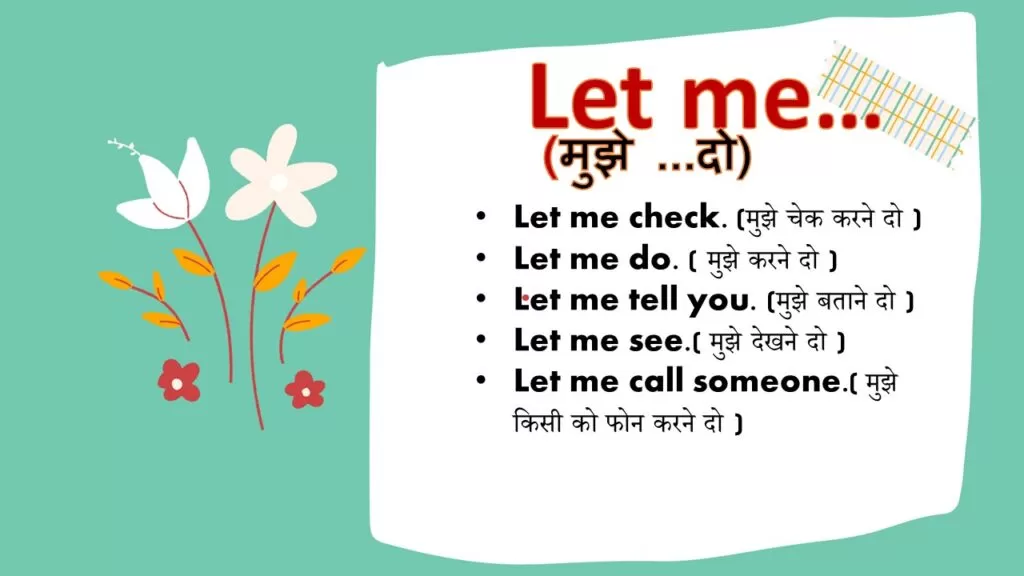
- Mam kya hum reading kre?
- मैम क्या हम रीडिंग करें ?
- Ma’am can we do reading?
- Jo tumne tanish se suna , kya usme galtiya nikli hai?
- जो तुमने तनिष से सुना , क्या उसमे गलतियाँ निकली है ?
- Did you find any mistake in spellings that were heard from Tanish?
- 4 ke table me 2 nhi aata.
- 2 is not in the table of 4.
- Iske baad underline kiye hue spellings yaad kro.
- After this you have to learn the underlined spellings.
Mujhe ‘apple’ ke spelling btao?
Tell me the spelling of ‘APPLE’?
Kya tum meri goud me bathoge, jra aage ho jao.
Will you sit in my lap? Move a bit.
Mai chhuti le rha hu.
I am taking leave.
Mai chhuti de rha hu.
You can leave now.
Mam where should I write the table?
Ma’am where should I write the table?
How to describe different types of pain in English through Hindi
Sometimes we find it difficult to express and describe different types of pain in English through hindi . Undoubtedly the pain is totally awful and no one wants to bear it. But sadly, it’s a constant part of human experience. In English we have pain vocabulary. In this English lesson we will learn how to describe different types of pain in English through Hindi.
Video help on How to describe different types of pain in English through Hindi:
Here are the few sentences:
1. I sprained my ankle yesterday.
(आइ स्प्रेन्ड माय एंकल यैस्टरडे)
कल मेरे टखने में मोच आ गई |
(kal mere takhne mein mocha a gayi)
2. I got a cramp in my leg.
(आइ गाॅट अ करैम्प इन माय लैग)
मेरी टांग में खींच पड़ गई।
(meri taang mein kheench par gayi)
3. I am feeling dizzy.
(आइ एम फीलिंग डिज़ी)
मुझे चक्कर आ रहे हैं।
(mujhe chakkar aa rahe hain)
4. I am suffering from viral infection.
( आई ऍम सफ़रिंग फ्रॉम फिवर)
मुझे वायरल इन्फेक्शन हो गया है |
(mujhe viral infection ho gya hai)
5. I have a bad headache.
( आई हैव अ बैड हैडएक)
मुझे बहुत ज्यादा सिर दर्द है |
(mujhe bahut jyada sir dard ho raha hai)
6. I have backache.
(आइ हैव बैकएक)
मेरी पीठ में बहुत दर्द हो रहा है।
(meri peeth mein bahut dard ho raha hai)
7. I have toothache.
(आइ हैव टुथएक)
मेरे दान्त में दर्द है।
(mere daant mein dard hai)
8. I have sore throat.
(आइ हैव सोर थरोट)
मेरा गला पका हुआ है।
(mera gala paka hua hai)
9. I have throat infection.
(आइ हैव थरोट इन्फैक्शन)
मेरे गले में इन्फैक्शन है।
(mere gale mein infection hai)
10. I have an eye infection.
(आइ हैव ऐन आइ इन्फैक्शन)
मेरी आँखों में इन्फैक्शन है।
(meri aankhon mein infection hai)
11. I have sore eyes.
(आइ हैव सोर आइज)+
मेरी आँखों में लाली आ गई है।
(meri aankhon mein laali aa gayi hai)
12. My eyes are puffy today.
(माय आइज़ आर पफी टुडे )s
आज मेरी आँखें सूजी हुई हैं।
(aaj meri aankhein sooji hui hain)
13. I have ear infection.
vkb gSo bvj bUQSD”ku)
esjs dku esa bUQSD”ku gSA
(mere kaan mein infection hai)
14. I have stiffness in my shoulders.
(आइ हैव स्टिफनैस इन माय शोल्डर्स +Z)
मेरे कंधों में जकड़न है।
(mere kandhon mein jakdan hai)
15. I have nasal congestion.
(आइ हैव नेज़ल कन्जैशन)
मेरी नाक बंद है।
(meri naak band hai)
16. I have blocked nose.
(आइ हैव ब्लाॅकड नोज )
मेरी नाक बंद है।
(meri naak band hai)
17. I have runny nose.
( aआई हैव रनी नोज़ )
मेरी नाक बह रही है।
(meri naak beh rahi hai)
18. I am sneezing continuously.
(आइ एम सनीजिंग कन्टीन्यूज़ली)
मुझे छींकें आ रही हैं।
(mujhe chhenkein aa rahi hain)
19. I have bloated stomach.
(आइ हैव ब्लोटिड स्टमक)
मेरे पेट में गैस हो गई है ।
(mere payt mein gas ho gayi hai)
20. I feel constipated.
(आइ फील कान्सटीपेटिड)
मुझे कब्ज है।
(mujhe kabz hai)
21. I have diarrhea.
(आइ हैव डायरिया)
मुझे दस्त लगे हैं।
(mujhe dast lage hain)
22. I am Allergic to dust.
(आइ एम अलर्जिक टू डस्ट)
मुझे धूल से एलर्जी है।
(mujhe dhool se allergy hai)
23. I have injury in my leg.
(आइ हैव इंजरी इन माय लैग)
मेरी टांग में चोट लगी है।
(meri taang mein chot lagi hai)
24. This is very chronic disease.
(दिस इज़ वैरी करोनिक डिसीज +)
ये लम्बी बीमारी है।
(yeh lambi beemari hai)
25. This is your prescription note.
(दिस इज़ यूअर परैसकरिपशन नोट)
ये तुम्हारी दवाई की पर्ची है।
(yeh tumhari dawai ki parchi hai)
English Speaking with kids -Day 6
Day 6 : In today’s lesson you will learn English conversation with kids. My lessons on English speaking with kids through Hindi will help you a lot. I have added many sentences on basic English for kids. So that you can learn English through Hindi to speak with kids.
1. Can’t you sit still?
(कांट यू सिट स्टिल?)
तुम टिक कर नहीं बैठ सकते?
(Kya tum tik kar nahin baith sakte?)
2. Get ready, Hurry up.
(गेट रेडी, हर्री अप)
जल्दी तैयार हो जाओ।
(Jaldi taiyar ho jayo.)
3. Stop playing games on mobile.
(स्टॉप प्लेयिंग गेम्स ओन मोबाइल)
मोबाइल से खेलना बंद करो।
(Mobile se khelna band kro.)
My Video on English speaking with kids through Hindi will help you with pronunciation.
4. Hold my mobile properly.
(होल्ड माय मोबाइल प्रोपेर्ली)
मेरा मोबाइल ध्यान से पकड़ो।
(Mera mobile dhyan se pakdo)
5. Brush your teeth properly.
(ब्रश योर टीथ प्रोपेर्ली)
अपने दांत अच्छे से साफ़ करो।
(Apne daant achchhe se saaf kro)
6. Put on your clothes.
(पुट ओन योर क्लोथ्स)
अपने कपड़े पहन लो।
(Apne kapde pehan lo)
7. Tie your laces.
(टाई योर लेसेस)
अपने तसमे बांध लो।
(Apne tasme pehan lo)
8. Don’t drag your feet.
(डोन्ट ड्रैग योर फीट)
पैर मत घसीटो।
(pair mt ghaseeto)
9. Finish your food, Hurry up.
(फिनिश योर फ़ूड, हर्री अप)
जल्दी अपना खाना खत्म करो।
(jaldi apna khana khatam kar lo)
10. Keep your dishes in the sink.
(कीप योर डिशेस इन द सिंक)
अपने बर्तन सिंक में रखो।
(Apne bartan sink me rakho)
11. Don’t put your finger in your mouth.
(डोन्ट पुट योर फिंगर इन योर माउथ)
अपनी उँगली मुँह में मत डालो।
(apni ungli muhn me mt dalo)
12. Blow your nose.
(ब्लो योर नोज़)
अपना नाक साफ करो।
(apna nak saaf kro)
13. Don’t bite your nails.
(डोन्ट बाइट योर नेल्ज़)
अपने नाखून मत चबाओ।
(apne nakhoon mt chbao)
14. Change your clothes.
(चेंज योर क्लोथ्स)
अपने कपड़े बदल लो।
(apne kapde badal lo)
15. Turn off the tap.
(टर्न ओफ्फ द टैप)
नल बंद करो।
(nal band kro)
16. Complete your Homework first.
(कम्पलीट योर होमवर्क फर्स्ट)
अपना काम पूरा करो।
(apna kaam poora kro)
17. Do your work properly.
(डू योर वर्क प्रोपेर्ली)
अपना कम अच्छे से करो।
(apna kaam achchhe se kro)
18. Write neatly.
(राईट नीटली)
सुन्दर लिखो।
(sundar likho)
19. Don’t fold your notebook.
(डोन्ट फोल्ड योर नोटबुक)
अपनी कापी को मत मोड़ो।
(apni kapi ko mt modo)
20. Don’t tear pages of your book.
(डोन्ट टेअर पेजेस ऑफ़ योर बुक)
अपनी किताब के पन्ने मत फाड़ो।
(apni kitab ke panne mt phado)
21. Do your work yourself.
(डू योर वर्क योरसेल्फ)
अपना काम खुद करो।
(apna kaamkhud kro)
22. Don’t disturb me, I am busy.
(डोन्ट डिस्टर्ब मी, आई एम् बिजी)
मुझे परेशान मत करो।
(mujhe pareshan mt kro)
23. You speaks a lot, baby.
(यू स्पीक्स अ लोट, बेबी)
बेबी, तुम बहुत बोलती हो।
(baby, tum bahut bolti ho)
24. Don’t break your toys.
(डोन्ट ब्रेक योर टॉयज)
अपने खिलोने मत तोड़ो।
(apne khilone mt todo)
25. Switch off the light.
(स्विच ओफ्फ द लाइट)
लाइट बंद करो।
(light band kro)
26. Don’t drag the chairs.
(डोन्ट ड्रैग द चेयर्स)
कुर्सी को मत घसीटो।
(kursi ko mt ghaseeto)
27. Remove your shoes.
(रिमूव योर शूज़)
अपने जूते उतार दो।
(apne joote utar do)
28. Keep your shoes in shoe-rack.
(कीप योर शूज़ इन शू–रैक)
अपने जूते रैक में रखो।
(apne joote rack me rakho)
29. Keep your school bag in almirah.
(कीप योर स्कूल बैग इन अल्मिरह)
अपने बैग अलमारी में रखो।
(apna bag almari me rakho)
30. Don’t touch the laptop.
(डोन्ट टच द लैपटॉप)
लैपटॉप को हाथ मत लगाओ।
(laptop ko haath mt lagao)
Short English Sentences(smart english)
We can speak these short English Sentences to impress others during conversation.
Watch Videos on Short English Sentences to make the concept more clear.
- Mai tum se shart lagata hu.
- I bet you.
- Chidana band kro.
- Stop teasing.
- Tum manhoos ho.
- You are jinx.
- Thande dimaag se socho.
- Think calmly.
- Kanafusi mat kro.
- Don’t whisper.
- Use mnao.
- Convince him.
- Aank mat maro.
- Don’t wink.
- Nazar na lge.
- Touch wood.
- Mera sir mat khao.
- Don’t nag me.
- Tang mat adao.
- Don’t interrupt.
- Maan jao.
- Now, give in.
- Use shod do.
- Leave him.
- Jid mat kro.
- Don’t insist.
- Use andr bhejo.
- Sent him in.
- Mujhe jane do.
- Let me go.
- Chillao mat.
- Don’t shout.
- Mai bhi.
- Me too.
- Or kya ?
- What else?
- Kal milenge?
- See you tomorrow.
- Yha thehro.
- Wait here.
- Koi baat nhi .
- Never mind.
- Idhar dekho.
- Look here.
- Ye lo.
- Take it.
- Upper jao.
- Go up.
- Neeche jao.
- Go down.
- Dheere chlo.
- Go slowly.
- Utar jao.
- Get off.
- Savdhan rho.
- Be careful.
- Magarmachh ke aansoo.
- Crocodile’s tear
- Ye kafi hai.
- That’s enough.
- Mujhe dhmki mat do.
- Don’t insist.
- Sharmao mat.
- Don’t feel shy.
- Hitchkichao mat.
- Don’t hesitate.
- Apna gussa thook do.
- Spit out your anger.
- Meri kasam khao.
- Swear by me.
- Bhagwan jane
- God knows.
- Mujhe jane do.
- Let me go.
- Der mat kro.
- Don’t delay.
- Yha kooda mat fenko.
- Don’t litter here.
- Jyada baho mat khao.
- Don’t act so pricey.
- Jaldi khatam kro.
- Finish soon.
- Gussa mat kro.
- Don’t get angry.
- Yeh hota hai.
- It happens.
- Ghabrao mat.
- Don’t panic.
- Durvavhar mat kro.
- Don’t misbehave.
- Veh mera hai.
- That’s mine.
- Bilkul nhi.
- Not at all.
- I see
- Mai smajh gya.
- I am single.
- Mai avivahit hu.
- I think so.
- Mai esa sochta hu.
- I quit.
- Mai shodta hu.
- I am lost.
- Mai kho gya hu.
- I am home.
- Mai ghar par hu.
- I promise.
- Mai vada karta hu.
- I decline.
- Mai mna karta hu.
- Time is up.
- Smay smapt.
- Let go .
- Jane do.
- So long .
- Itna smay.
- Have fun.
- Mje kro.
- So do I .
- Mai bhi esa hi kru.
- How much ?
- Kitna?
- How many ?
- Kitne?
- After you.
- Aapke baad.
- You first.
- Pehle aap.
- My treat .
- Meri dawat.
- Good luck.
- Saubhagya .
- Follow me.
- Mere peechhe aao.
- Forget it.
- Rehne do.
- Watch out .
- Dhyan se.
- Keep in touch.
- Milte rehna.
- What’s new?
- Nya kya hai?
- Is it yours?
- Kya ye aapka hai?
- He is gone .
- Veh chla gya.
- That’s neat.
- Kafi achha hai.
- Control yourself.
- Saym rakhe.
- Sounds great.
- Achha lagta hai.
- Are you there?
- Tum vha ho?
- Congratulation.
- Vdhai ho.
- Do it right .
- Shi se kro.
- I am bored.
- Mai ubh gya hu.
- That happens.
- Esa hota hai.
- Slow down.
- Dheeme chlo.
- Relax .
- Aaram se.
- Don’t wink.
- Aank mat maro.
- Serve the food.
- Khana lga do.
- Keep mum.
- Chup rho.
- See him off.
- Usse vida kro.
- Aap pari ki trah lagti hu.
- You look like angel.
- Tum behad khubsurat lagti ho.
- You look stunning .
- You caste a spell on me.
- Tum mujh par jadu kar deti ho.
- Your face is dazzling like a moon.
- Tumhara chehra chaand ki trah chamk rha hai.
Digraph ph and gh
Digraph consists of two consonants that are blended to make one sound. Digraph ph and gh has the sound of ‘f’ .
Watch video for better understanding
ph = f
gh = f
here are some examples of digraph ph and gh
| Words with diagraph ‘ph’ | ||
| Autograph | Microphone | Phone |
| Cellophane | Nephew | Phonics |
| Diagraph | Orphan | Geography |
| Dolphin | Phantom | Alphabet |
| Elephant | Pharmacist | Photographer |
| Graph | Pheasant | Sphere |
| Words with diagraph ‘gh’ |
| Laugh |
| Laughter |
| Rough |
| Tough |
| Cough |
| Trough |
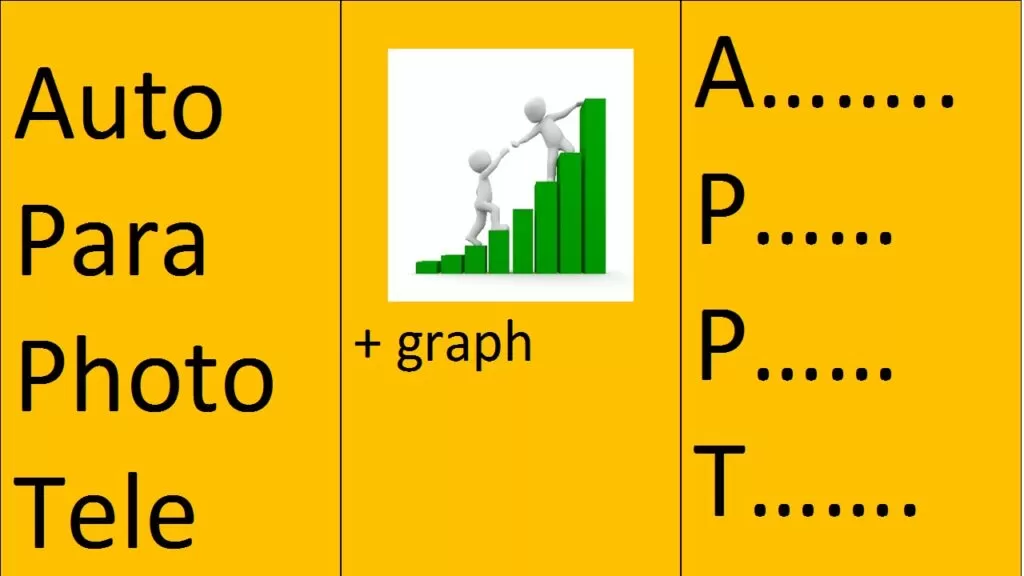
Advanced Phonics -air/are/ear – Word List
Advanced Phonics -air/are/ear have same phonic sound as given in the examples below. Such type of words are also known as homophones . A homophone is a word that is pronounced the same as another word but differs in meaning. A homophone may also differ in spelling.
Watch video for help:
| air | are | ear |
| Fair | Bare,dare | bear |
| Lair | Hare , pare | pear |
| Pair | Rare , flare | swear |
| Chair | Scare , stare | hear |
| Fair | Care , fare | near |
| Stair | Mare , bare | underwear |
| hair | Glare , share | wear |
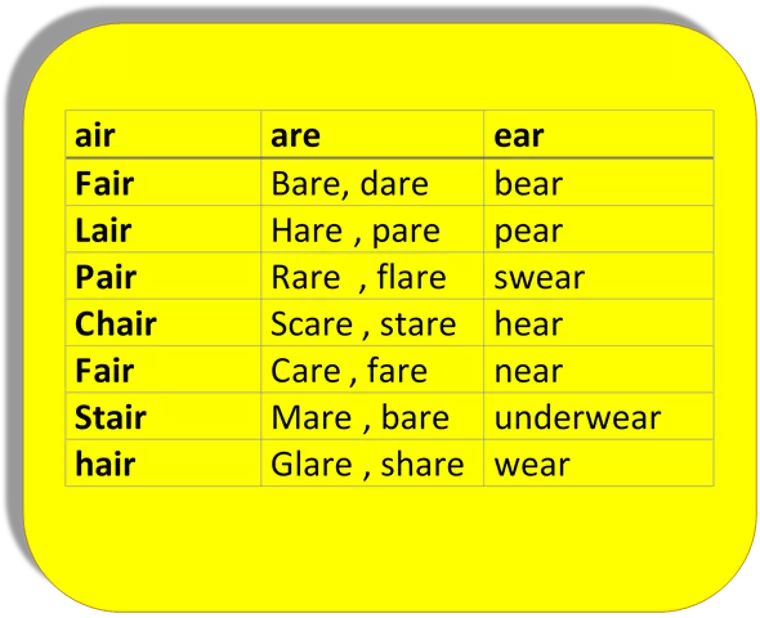
Magic E Rule in English-Long A
Magic E rule in English-Long A in English states that when the letter “e’ sits at the end of the word , it is usually silent and the ‘magical E ‘ tells the first vowel to say its name or long sound. For e.g: Long A = a_e
Watch video for help:
Long U = u_e
Here are some examples of Long A:
| Long A | Word form |
| ace | -ace |
| face | -ace |
| Lace | -ace |
| Mace | -ace |
| Pace | -ace |
| Race | -ace |
| Brace | -ace |
| Grace | -ace |
| Place | -ace |
| Trace | -ace |
| Bade | -ade |
| Fade | -ade |
| Jade | -ade |
| made | -ade |
| Wade | -ade |
| Blade | -ade |
| glade | -ade |
| grade | -ade |
| shade | -ade |
| age | -age |
| cage | -age |
| gage | -age |
| page | -age |
| rage | -age |
| sage | -age |
| wage | -age |
| stage | -age |
| Bake | -ake |
| Cake | -ake |
| Fake | -ake |
| Jake | -ake |
| Lake | -ake |
| Make | -ake |
| Quake | -ake |
| rake | -ake |
| Gape | -ape |
| Grape | -ape |
| Nape | -ape |
| Drape | -ape |
| Taste | -ape |
| Waste | -ape |
| Paste | -ape |
The vowel team rules states when to vowels go walking and first does talking and second vowel is silent.
Maid
Brain
Paint
Aim
Bait
Braid
Brain Chain
Braise Detail
Phonics sounds (with worksheet)
Phonics sounds of words having long u (you) sound : ue , ew, u_e
| Cue | Few | Cube |
| Clue | Dew | Mule |
| Value | New | Fuse |
| Fuel | Strew | Tune |
| Argue | News | Tube |
| Rescue | News | Duke |
| Barbecue | Threw | Rude |
| Glue | grew | |
| Blue |
Fill the Star with “RED” colour having sound of “ew”
Fill the Star with “PINK” colour having sound of “ue”
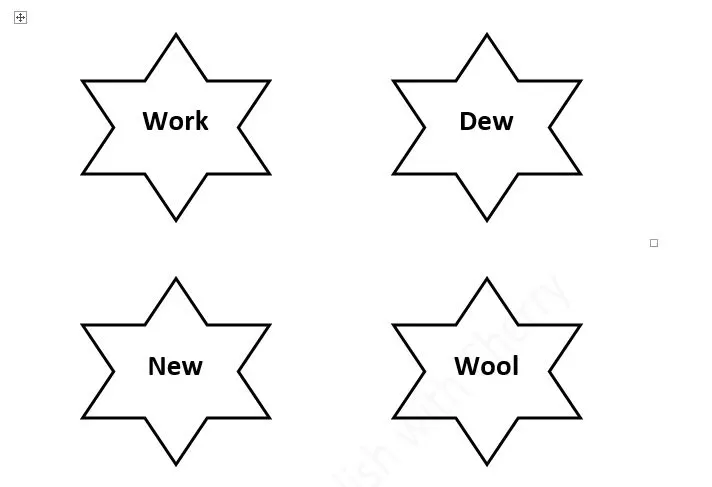
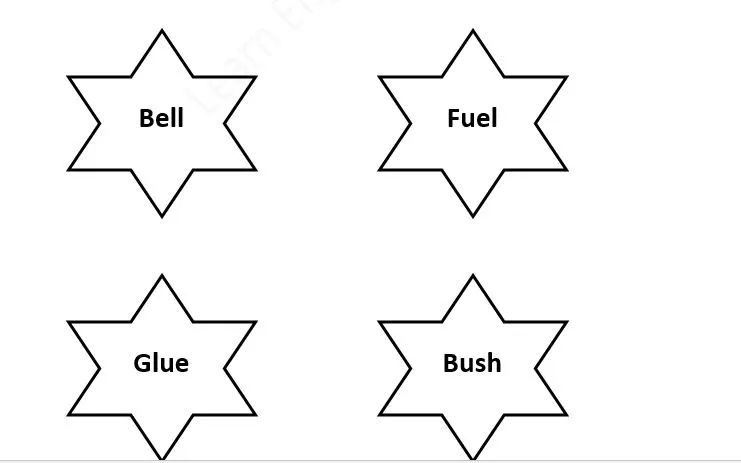
Words with phonic sounds long i : ….igh , ….ight
Write the opposite words
| Day | ________________ |
| Low | ________________ |
| Loose | ________________ |
| Left | ________________ |
| Dim | ________________ |
| Dark | ________________ |
Recent Comments